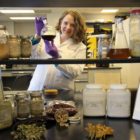 It’s Squib Saturday. Time to share the best, most interesting (or most entertaining, or most outrageous) tidbit of information I’ve gleaned from all the stuff I’ve read this week. Today: Waging War on A Superbug
It’s Squib Saturday. Time to share the best, most interesting (or most entertaining, or most outrageous) tidbit of information I’ve gleaned from all the stuff I’ve read this week. Today: Waging War on A Superbug
So, at least there is one issue all the countries in the world agree on. Well, 193 countries, anyway. (And, it’s not that Donald Trump is an overweight, mendacious, narcissistic, tweeting buffoon.) What they all agreed on at the recent annual meeting of the U.N. General Assembly in New York is that we face one common enemy: the Superbug.
Untreatable Gonorrhea
 The Assembly acknowledged that drug-resistant bacteria are a “fundamental threat to global health and safety,” Of the 700,000 people who die annually of drug-resistant infection, 23,000 of them live in the U.S. It is estimated that by 2050, such infections will kill 10 million people a year. Dr. Margaret Chan, the director-general for the World Health Organization said, “On current trends, a common disease like gonorrhea may become untreatable.” The Assembly voted unanimously to encourage antibiotic development.
The Assembly acknowledged that drug-resistant bacteria are a “fundamental threat to global health and safety,” Of the 700,000 people who die annually of drug-resistant infection, 23,000 of them live in the U.S. It is estimated that by 2050, such infections will kill 10 million people a year. Dr. Margaret Chan, the director-general for the World Health Organization said, “On current trends, a common disease like gonorrhea may become untreatable.” The Assembly voted unanimously to encourage antibiotic development.
Blame for the proliferation of antibiotic resistance has been laid at the door of farmers who administer antibiotics to promote faster growth of their livestock. Equally to blame are patients who demand, and physicians who overprescribe antibiotics for viral diseases like ear infections and colds which are not curable by antibiotics.
Microbial Gladiators
In a New York Times Magazine article, writer Ferris Jabr recently wrote : “Although antibiotics are designed to be as lethal as possible to dangerous bacteria, there are often a few inherently resilient microbes that survive and proliferate, passing on their genes — and grit– to their offspring. As subsequent generations of these microbial gladiators endure further onslaughts of drugs, they evolve even greater resilience, improving their defenses against antibiotics.”

Currently, pharmaceutical companies are not showing any interest in developing new antibiotics. The last new class of antibiotics was developed in 1984. For Big Pharma there is more money to be made in manufacturing drugs to lower cholesterol, fight depression and treat chronic pain. But that may change as the situation becomes more dire. In his splendid article, Jabr focusses on Cassandra Quave, a leading ethnobotanist at Emory University, Atlanta who is looking for remedies in the plant kingdom, and among indigenous populations who rely on plants for their medicines.
Medieval Medicine
 Which is no more far fetched than physicians who are returning to ancient medical procedures like using leeches and the saliva of these bloodsucking worms in certain rare medical treatments. In fact, it is a lot less far-fetched.
Which is no more far fetched than physicians who are returning to ancient medical procedures like using leeches and the saliva of these bloodsucking worms in certain rare medical treatments. In fact, it is a lot less far-fetched.
As of 2003, 25 per cent of modern medicines derived from plants yet “only a tiny fraction of the estimated more than 50,000 medicinal plants used around the globe have been studied in the lab,” writes Jabr. In any event, Cassandra Quave is not discouraged by Big Pharma’s current apathy to developing complex botanicals into a new generation of antibiotics. “In the near future, they’ll have to,” she says. “Western medicine will stop without antibiotics.”
Photo Credits: Top two and bottom photo : Bloomicon; palinchak and IamTK w/bigstockphoto.com